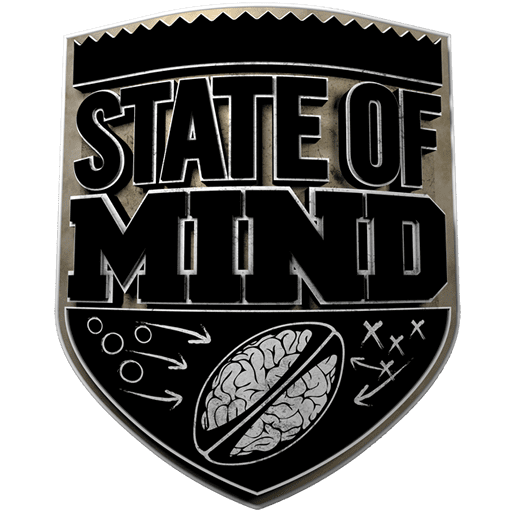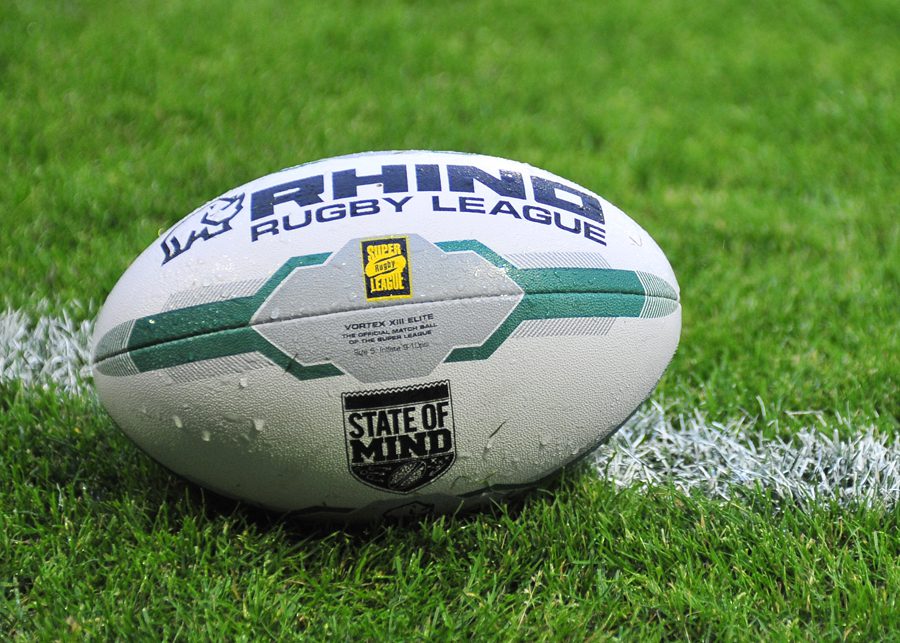Be ManKind Campaign By Olivia Huxtable Bristol, United Kingdom
Throughout the Be ManKind Campaign, people have asked me what inspired me to set it up and many have assumed that I have experienced close male friends or family members suffering from mental health problems. My initial response was that I’m lucky that is not the case, but I soon realised that for me to think no man around me has dealt with or is dealing with mental illness is naive. Unfortunately, we are living in a time where it is sadly extremely common. If I believe there is not one guy around me who is suffering, I must not be listening or paying attention to the men I know, but more importantly, they must not feel comfortable in talking about these problems to me.
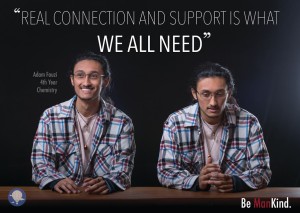
We must ask people the generic ‘how are you?’ in passing conversation multiple times a day, but the extent to which we engage with the reply is minimal. The purpose of this campaign was to show that when you ask the generic ‘hey you okay?’ you will more likely than not receive a pleasant response. However, if you take the time to really ask how someone is, this is when the mask falls away and you begin to see another side which that person does not often share publicly. Inspired by the works of Andrew. H. Walker*, this campaign tries to show there are two sides to every man; the side they feel will be accepted and therefore safe in showing, and the side they tend to hide and address alone. Thanks to my incredibly brave volunteers, the Be ManKind Campaign tries to show that revealing both of these sides is needed, is inspiring, and is acceptable. You can never underestimate the power a simple conversation can have on someone who is suffering. By turning a casual ‘how are you?’ to a ‘how are you doing today? Do you need to talk?’ and focusing on their response, you could make the world of difference to someone’s outlook.
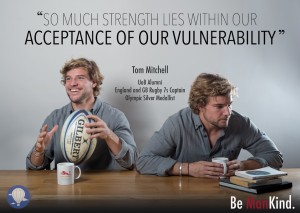
Suicide is the single biggest killer of men under the age of 45 in the UK and in 2015, 75% of all UK suicides were male**. My intention with this campaign was to raise awareness, not money because I think the main issue we are facing with male mental health is the stigma surrounding it, which cannot be fixed with donations. There exists in society the strange notion that men need to stay composed, strong and to not shed a tear but as well all know these are not the traits of our mankind. In some respects these constraints are harboured in university; the environment can encourage men to hide behind a ‘laddish’ facade with emphasis on sport and drinking. Whilst this culture is not wrong, as many of us enjoy that part of ‘uni’ life, its existence should not undermine the need for men to feel accepted for being open about any problems they encounter. My hope is that men around the university will see the Be ManKind Campaign and realise they are not alone, that it is ok to struggle with mental illness and that it is 100% acceptable to talk about it. The masculine nature of sports, ‘lads’ and the pressures of university itself are not going anywhere soon, but that does not mean it cannot accept a more compassionate and fragile side.
The volunteers came to the studio and I asked them to sit at a desk whilst I had a conversation with them and the photographer captured their reactions. During the first part of the discussion I tried to get to know them and ask them simple, light-hearted questions. Throughout this time, every single man had a very relaxed and open body behaviour and seemed fairly comfortable to be sat in front of a flashing camera. I then directed the conversation to a far more intense topic; once I had asked what their reasons were for taking part, this relaxed front that was so strong a few seconds previously, slowly seemed to whittle away. The degree to which the guys wanted to talk about mental health varied, and whilst not every volunteer had a first-hand account of facing mental health, each one had a story, experience or thought they shared. In fact, we have all been sadly affected by mental health at the University of Bristol this year.
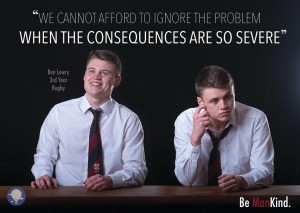
When you look at these photos, you would think the expressions are staged yet the majority of photos are their natural reactions to the two different conversations. Surprisingly, some of these photos were taken a mere minutes or even seconds apart but the difference could not be more obvious. I did not expect the contrast in these two ‘sides’ of the volunteers to appear so strongly and most of the men were surprised by how much their facial expressions and body language changed by a simple transition of conversation. I also did not expect the guys to share as much as they did; there were some men who jumped at the chance to just talk about their problems in an understanding environment and it seemed to open a gateway for them. It was in these moments I realised this campaign was far more necessary than I had originally thought. Before doing this campaign, I held the naïve view it was too difficult to get a man to ‘open up’ and had turned a blind eye to ever trying. Yet this experience has taught me that if you just sit, ask and listen, there is a whole dimension of emotion some men are craving to share, if only they were given the chance without judgement.
I chose to primarily focus on people who play sports at the university because for me, sport is a great tool to helping my mental health. I think that your time at university is one of the only times you will be presented with such a range of easily accessible sports and activities and where you have the time to get involved. We seem to forget how amazing sport is for our mental health because the main focus in society and on social media is to first and foremost improve our physical appearance. If the approach to sport revolved more around improving people’s mental wellbeing, instead of their ‘summer bodies’, people may be encouraged and less intimidated to take part and feel the benefits of sport on their mental health.
I would like to thank every single person who got involved in this project. Firstly, to my incredible photographer Jack Willingham, (http://jackwillingham.com/) who helped turn the idea I had whilst procrastinating in the library into incredible photography. From day one you let me freely run with the concept and editing, and helped to create something magnificent. I highly commend you for being able to put up with my lack of common sense for the past month but more importantly for supporting and listening to the men who took part.
Secondly, to anyone who has spread the word, liked, shared or talked about the Be ManKind Campaign. You have been instrumental in sharing its message and enabling me to find some incredible men to join it. A very special thank you goes to Tom Mitchell, a University of Bristol alumni and the captain of the GB and England Rugby 7s who took time out of his busy training schedule to take part. His involvement demonstrates how mental health can affect you no matter how successful you become and his continued connection with the university represents the strong community here at Bristol. Thirdly, to the University of Bristol Student’s Union for funding this project and to both the SU and SEH for understanding the urgency of student mental health.
And last but absolutely not least, to the men in front of the camera; thank you so much for breaking out of your comfort zones and sharing your stories with me. Your strengths of character have amazed me throughout this and I hope when people scroll past this album on Facebook and recognise your faces, they will respect and appreciate you all for your courage. To take part in something so personal that would get shown to your peers is an incredibly brave thing to do and I was blown away by every single one of you.
My final request from anyone who scrolls past this on social media or walks past a poster on campus, whether you are a University of Bristol student or not, is that you read, share, like and think about this campaign. By doing so you are telling your friends that you are there for them, ready and waiting to listen if they ever need you. Because now is the time for men to feel safe about speaking up, now is the time for us to listen, and now is the time for every single one of us to Be ManKind.
*http://www.andrewhwalker.com/
** http://www.samaritans.org/about-us/our-research/facts-and-figures-about-suicide
— IF you or someone you know needs to talk and seek help, there are numerous pathways to pursue in and around Bristol.
– Epigram recently launched their #14conversations for the charity Off The Record, a Bristol based charity giving free counselling. You can find them at this address:
2 HORFIELD ROAD, ST MICHAEL’S HILL
0808 808 9120.
UNIVERSITY OF BRISTOL STUDENT COUNSELLING
3RD FLOOR, HAMPTON HOUSE, ST MICHAEL’S HILL, BS6 6AU (student health building)
http://www.bristol.ac.uk/student-counselling
BRISTOL MINDLINE
0808 808 0330
8PM-MIDNIGHT WED-SUN
SAMARITANS
116 123.
37 ST NICHOLAS STREET, BS1 1TP
SANELINE
0845 767 8000
6PM-11PM
BRISTOL NIGHTLINE
0117 9266 266
8PM-8AM
PAPYRUS
0870 170 4000
7PM-10PM MON-FRI
2PM-5PM WEEKENDS
